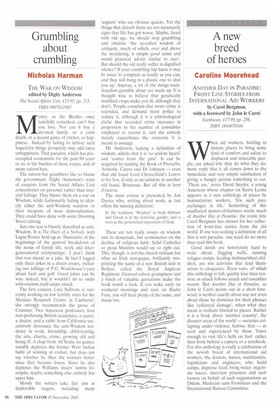Grumbling about crumbling
Nicholas Harman
THE WAR ON WISDOM edited by Digby Anderson The Social Affairs Unit, £15.95, pp. 215, ISBN 0907631983 Money, as the Beatles once tunefully remarked, can't buy you love. Nor can it buy a devoted family, or a calm death, or a decent game of cricket, or happiness. Indeed by failing to deliver such hoped-for things prosperity may add extra unhappiness. That paradox, which has preoccupied economists for the past 80 years or so, is the burden of these essays, and of many saloon bars.
The saloon-bar grumblers like to blame the government. Digby Anderson's team of essayists from the Social Affairs Unit concentrates on personal rather than societal failings. They blame them on a war on Wisdom, while fashionably failing to identify either the anti-Wisdom warriors or their weapons of mass demoralisation. They could have done with some Downing Street editing.
Just one text is bluntly described as antiWisdom. It is The Diary of a Nobody. with Lupin Pooter held up as 'illustrative of the beginnings of the general breakdown of the nexus of family life, work and intergenerational relationships'. I don't think that was meant as a joke. In fact I logged only three jokes in a dozen essays, including two tellings of P.G. Wodehouse's yarn about God and golf. Good jokes can be wise indeed, but it wouldn't do to smile with wisdom itself under attack.
The first essayist, Lucy Sullivan. is 'currently working on low fertility rates for the Menzies Research Centre in Canberra'; she strongly recommends the prose of Cranmer. Two American professors, four non-professing British academics, a rector, a doctor, and a rabbi from California successively denounce the anti-Wisdom tendency in work, friendship, child-rearing, the arts, charity, crime, growing old and being ill. A chap from All Souls, on games, notably deplores the former West Indian habit of winning at cricket, but does not say whether he likes the winners better since they became losers. Since he also deplores the Williams sisters' tennis triumphs, maybe something else entirely has upset him.
Mostly the writers take fair aim at deplorable targets, including many 'experts' who are obvious quacks. Yet the things that disturb them are not necessarily signs that life has got worse. Maybe, faced with old age, we should stop grumbling and emulate 'the so-called wisdom of antiquity, much of which, over and above the moralising, is simple good sense and sound practical advice similar to ours'. But should the old really suffer in dignified silence? If your crumbling hip hurts it may be wiser to complain as loudly as you can, and they will bung in a plastic one to shut you up. Anyway, a lot of the things traditionalists grumble about are made up. It is thought wise to believe that genetically modified crops make you ill, although they don't. People complain that more crime is recorded, and demand more police to reduce it, although it is a criminological cliche that recorded crime increases in proportion to the number of constables employed to record it, and the remedy merely exacerbates the concerns it is meant to assuage.
Mr Anderson, lacking a definition of wisdom, admits that it is 'so seldom heard' and 'comes from the past'. It can be acquired by reading the Book of Proverbs, Aristotle, Cicero and Dr Johnson — even that old fraud Lord Chesterfield's Letters to his Son, if only as an antidote to another old fraud, Rousseau. But all this is hors d'oeuvre.
The main course is presented by Jon Davies who, writing about work, at last offers the missing definition:
In the tradition, 'Wisdom' in both Hebrew and Greek is in the feminine gender; and is seen as the personified expression of God.
These are not really essays on wisdom and its desuetude, but sermonettes on the decline of religious faith. Solid Catholics or pious Muslims would say so right out. This, though, is not the church militant but what an Irish newspaper, brilliantly misprinting the name of a new British unit in Belfast, called the Royal Anglican Regiment. General robust grumpiness and a batch of valuable quotations make the book worth a look. If you wake early on weekend mornings and turn on Radio Four, you will hear plenty of the same, and music too.


























































































 Previous page
Previous page